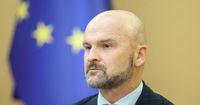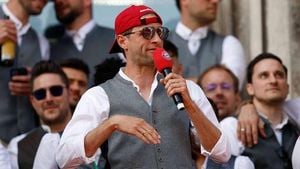On May 9, 2025, at 8:00 PM, the presidential debate organized by Republika television commenced, co-hosted by wPolsce24 and TV Trwam. This event is particularly significant as it occurs just one week before the election silence, with the first round of the presidential elections scheduled for May 18, 2025.
This debate marks the third organized by TV Republika in the lead-up to the upcoming elections. Among the participants are notable figures including economist Artur Bartoszewicz, Marshal of the Sejm Szymon Hołownia, MEP Grzegorz Braun, MP Sławomir Mentzen, former SLD MP Joanna Senyszyn, MP Marek Jakubiak, Razem party candidate Adrian Zandberg, PiS-backed candidate Karol Nawrocki, journalist Krzysztof Stanowski, and candidate Marek Woch. However, the debate is notably missing key figures such as Warsaw Mayor Rafał Trzaskowski, Deputy Speaker of the Senate Magdalena Biejat, and journalist Maciej Maciak.
Rafał Brzoska, the president of InPost, has been confirmed as one of the experts asking questions during the debate. Brzoska's inquiries delve into pressing issues, including the controversial topic of raising the retirement age. He posed a pointed question to the candidates: "Will you support raising the retirement age, and if not, will you promote incentives for longer work?" His concerns stem from the looming labor shortage in Poland due to an aging population.
Karol Nawrocki, representing the Civic Coalition and backed by PiS, firmly opposed the idea of raising the retirement age, stating, "I will never sign off on raising the retirement age." He did, however, suggest that incentives for seniors to continue working could be considered.
Szymon Hołownia echoed the sentiment that the future of the labor market is dire, predicting a catastrophic situation in 10 to 15 years. Yet, he categorically rejected the notion of increasing the retirement age, emphasizing the need to create incentives for seniors to remain in the workforce longer.
Sławomir Mentzen also expressed his opposition to raising the retirement age, suggesting that incentives should include eliminating taxes and contributions for seniors. Meanwhile, Marek Jakubiak acknowledged the necessity for retirees to have the opportunity to work longer if they choose.
Krzysztof Stanowski, known for his candid remarks, added an ironic twist, suggesting that average Poles might end up working until they die, while city presidents could retire much earlier than current laws dictate. Adrian Zandberg appeared to have missed his chance to respond directly to the retirement age question, while Artur Bartoszewicz challenged the very concept of a retirement age, arguing that it is an outdated notion that does not align with the realities of the Polish economy. He proposed that the pension system should be funded through external sources, such as dividends from state-owned companies and profits from the extraction of Poland's natural resources.
Marek Woch raised concerns about the fairness of the retirement system, questioning the fate of those who have worked for decades and are patiently waiting to reach retirement age. He asked, "What about seniority pensions?" This highlights the ongoing debate about how to balance the needs of the aging workforce with economic realities.
In addition to the retirement age discussions, Brzoska also brought up the topic of deregulation in the Polish economy, specifically asking if candidates would support the principle of "one for two," which suggests that for every new regulation introduced, two existing ones should be eliminated. Nawrocki quickly affirmed his support for this principle, stating, "I am a proponent of the 'one for two' rule."
Joanna Senyszyn acknowledged that Poland is currently over-regulated, making a strong case for the necessity of deregulation, but cautioned against expecting the "one for two" rule to be implemented, suggesting it should be "put between fairy tales." Grzegorz Braun, on the other hand, argued that merely introducing the "one for two" rule would not suffice, insisting that the Polish economy requires a more radical approach, including the elimination of taxes and contributions entirely.
Adrian Zandberg pointed out that discussions around the "one for two" principle have been ongoing for a long time without any real implementation, criticizing Brzoska for not addressing the needs of ordinary workers who are the backbone of the economy.
This debate, featuring a diverse array of candidates and experts, highlights the critical issues facing Poland as it approaches the presidential elections. With the absence of prominent figures like Trzaskowski and Biejat, the debate reflects a landscape of varying opinions on economic policies, retirement age, and the future direction of the country.
As the election date draws near, the candidates' positions on these pressing issues will likely play a significant role in shaping voter sentiment and determining the outcome of the elections.




